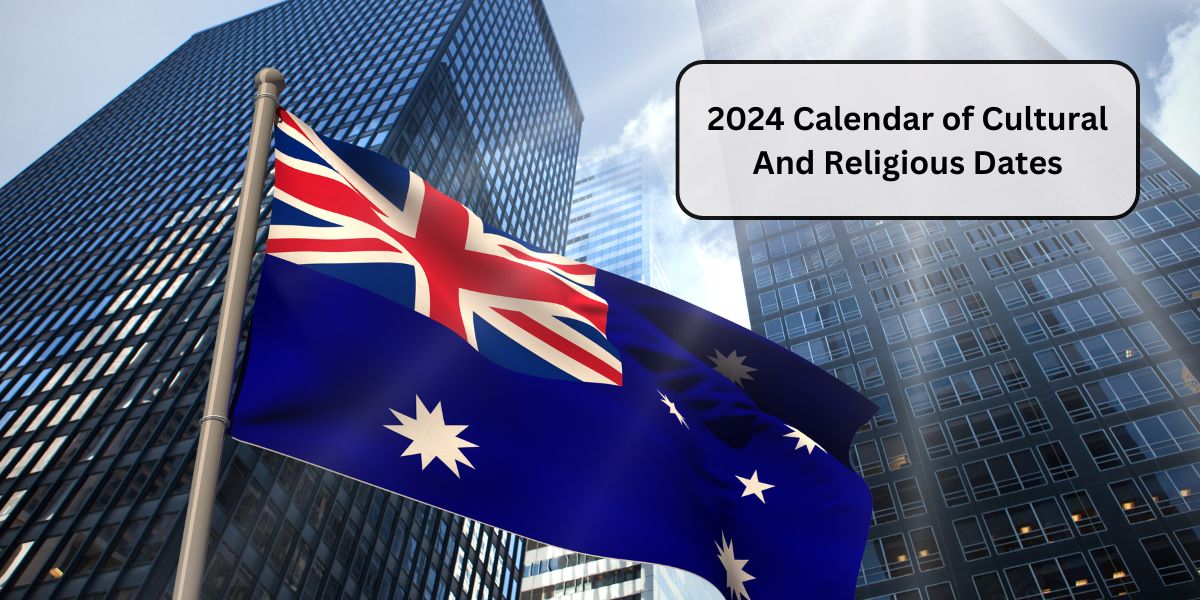Every year, communities worldwide come together to celebrate various festivals and observances that highlight their cultural, religious, and historical significance. These celebrations offer a glimpse into the rich tapestry of human traditions and beliefs. In this blog, we will explore notable events from July to December, delving into their origins, meanings, and the unique ways in which they are observed.
Contents
- 1 Calendar of Cultural And Religious Dates In Australia
- 1.1 July
- 1.2 August
- 1.2.1 National Aboriginal & Torres Strait Islander Children’s Day (August 4)
- 1.2.2 Hiroshima Day (August 6) and Nagasaki Day (August 9)
- 1.2.3 International Day of the World’s Indigenous Peoples (August 9)
- 1.2.4 Feast of the Assumption of the Blessed Virgin Mary (August 15)
- 1.2.5 Raksha Bandhan (August 19)
- 1.2.6 Australian South Sea Islanders National Recognition Day (August 25)
- 1.2.7 Krishna Janmashtami (August 26)
- 1.3 September
- 1.3.1 Onam (September 5)
- 1.3.2 Ganesh Chaturthi (September 6)
- 1.3.3 Enkutatash (Ethiopian New Year) (September 11) and Nayrouz (Coptic New Year) (September 11)
- 1.3.4 Mawlid Al-Nabi (Birth of the Prophet Muhammad) (September 15)
- 1.3.5 Chuseok (September 16-18)
- 1.3.6 Mid-Autumn (Moon) Festival (September 17)
- 1.3.7 Tết Trung Thu (September 17)
- 1.3.8 Tsukimi (September 17)
- 1.3.9 Australian Citizenship Day (September 17)
- 1.4 October
- 2 Related Post
- 2.1 November
- 2.1.1 Bandi Chhor Divas (The Celebration of Freedom) (November 1)
- 2.1.2 All Saints’ Day (November 1) and All Souls’ Day (November 2)
- 2.1.3 Birth of the Báb and Birth of Bahá’u’lláh (November 2-3)
- 2.1.4 Bestu Varas (Gujarati New Year) (November 2)
- 2.1.5 Dia de los Muertos (Day of the Dead) (November 2)
- 2.1.6 Bhai Tika (November 3)
- 2.1.7 Loy Krathong (November 15)
- 2.1.8 Guru Nanak Gurpurab (November 15)
- 2.1.9 International Day for Tolerance (November 16)
- 2.1.10 The Ascension of Abdu’l Baha (November 26)
- 2.1.11 St Andrew’s Day (November 30)
- 2.2 December
- 2.2.1 First Sunday of Advent (December 1)
- 2.2.2 Bodhi Day (December 8)
- 2.2.3 Shahidi (Martyrdom) of Guru Tegh Bahadur (December 17)
- 2.2.4 International Migrants Day (December 18)
- 2.2.5 Christmas Day (December 25)
- 2.2.6 Kwanzaa (December 25 – January 1)
- 2.2.7 Chanukah (December 25 – January 2)
- 2.2.8 New Year’s Eve (December 31)
- 2.3 Conclusion
Calendar of Cultural And Religious Dates In Australia
Here is the tabular form of cultural and regional dates in Australia:
| Date | Occasion |
|---|---|
| July 1 | Coming of the Light Festival |
| July 1 | International Tartan Day |
| July 7 | Al Hijri (Islamic New Year) |
| July 7-14 | NAIDOC Week |
| July 16 | Ashura |
| July 16-17 | Karsa (Mandaean New Year) |
| July 21 | Asalha Puja (Dhamma Day) |
| August 4 | National Aboriginal & Torres Strait Islander Children’s Day |
| August 6 | Hiroshima Day |
| August 9 | International Day of the World’s Indigenous Peoples |
| August 9 | Nagasaki Day |
| August 15 | Feast of the Assumption of the Blessed Virgin Mary |
| August 19 | Raksha Bandhan |
| August 25 | Australian South Sea Islanders National Recognition Day |
| August 26 | Krishna Janmashtami |
| September 5 | Onam |
| September 6 | Ganesh Chaturthi |
| September 11 | Enkutatash (Ethiopian New Year) and Nayrouz (Coptic New Year) |
| September 15 | Mawlid Al-Nabi (Birth of the Prophet Muhammad) |
| September 16-18 | Chuseok |
| September 17 | Mid-Autumn (Moon) Festival |
| September 17 | Tết Trung Thu |
| September 17 | Tsukimi |
| September 17 | Australian Citizenship Day |
| October 2 | Mahatma Gandhi Jayanti |
| October 2-4 | Rosh Hashanah |
| October 3-12 | Dashain |
| October 9-13 | Durga Puja |
| October 12 | Vijay Dashami |
| October 12 | Yom Kippur |
| October 13 | White Sunday |
| October 16-23 | Sukkot |
| October 17 | Kathina |
| October 20 | Gurgaddi (Inauguration) of Guru Granth Sahib |
| October 24-25 | Simchat Torah |
| October 24 | United Nations Day |
| October 28 | Oxi Day |
| October 31 | Deepavali |
| November 1 | Bandi Chhor Divas (The Celebration of Freedom) |
| November 1 | All Saints’ Day |
| November 2 | All Souls’ Day |
| November 2-3 | Birth of the Báb and Birth of Bahá’u’lláh |
| November 2 | Bestu Varas (Gujarati New Year) |
| November 2 | Dia de los Muertos (Day of the Dead) |
| November 3 | Bhai Tika |
| November 15 | Loy Krathong |
| November 15 | Guru Nanak Gurpurab |
| November 16 | International Day for Tolerance |
| November 26 | The Ascension of Abdu’l Baha |
| November 30 | St Andrew’s Day |
| December 1 | First Sunday of Advent |
| December 8 | Bodhi Day |
| December 17 | Shahidi (Martyrdom) of Guru Tegh Bahadur |
| December 18 | International Migrants Day |
| December 25 | Christmas Day |
| December 25 – January 1 | Kwanzaa |
| December 25 – January 2 | Chanukah |
| December 31 | New Year’s Eve |
July
Coming of the Light Festival (July 1)
The Coming of the Light Festival is a significant event for Torres Strait Islanders, commemorating the arrival of the London Missionary Society on Erub Island in 1871. This event led to the widespread adoption of Christianity among the island communities.
International Tartan Day (July 1)
International Tartan Day celebrates Scottish heritage and marks the repeal of an English law in 1782 that banned the wearing of tartan. North America celebrates this day on April 6, coinciding with the signing of the Declaration of Arbroath in 1320.
Al Hijri (Islamic New Year) (July 7)
Al Hijri marks the Islamic New Year, observed on the first day of Muharram. This day is significant for Muslims as it commemorates the migration (Hijra) of Prophet Muhammad from Mecca to Medina.
NAIDOC Week (July 7-14)
Aboriginal and Torres Strait Islander peoples are honored throughout NAIDOC Week for their rich history, vibrant culture, and remarkable accomplishments. This year’s theme, “Keep the Fire Burning! Blak, Loud & Proud,” encourages the recognition of Indigenous Australians’ contributions to society.
Ashura (July 16)
Ashura holds different significances for Sunni and Shia Muslims. For Sunnis, it marks Noah’s departure from the ark and Moses’ exodus from Egypt, while for Shias, it commemorates the martyrdom of Prophet Muhammad’s grandson, Hussein.
Karsa (Mandaean New Year) (July 16-17)
Karsa marks the Mandaean New Year and is a time for family gatherings and celebrations, beginning at dusk on July 16 and lasting for 36 hours.
Asalha Puja (Dhamma Day) (July 21)
Asalha Puja, or Dhamma Day, celebrates the first teaching of Buddha following his enlightenment. It is a significant festival for Theravada Buddhists.
August
National Aboriginal & Torres Strait Islander Children’s Day (August 4)
This day celebrates Indigenous children and their cultural heritage, first observed by the Secretariat of National Aboriginal and Islander Child Care (SNAICC) in 1988.
Hiroshima Day (August 6) and Nagasaki Day (August 9)
These days commemorate the victims of the atomic bombings of Hiroshima and Nagasaki in 1945, advocating for lasting world peace.
International Day of the World’s Indigenous Peoples (August 9)
The United Nations’ International Day of the World’s Indigenous Peoples promotes the protection and rights of indigenous peoples globally.
Feast of the Assumption of the Blessed Virgin Mary (August 15)
This Christian feast celebrates the assumption of the Virgin Mary into heaven, marking the end of her earthly life.
Raksha Bandhan (August 19)
Raksha Bandhan is a Hindu festival honoring the bond between brothers and sisters, symbolized by the tying of a rakhi thread.
Australian South Sea Islanders National Recognition Day (August 25)
This day acknowledges the recognition of Australian South Sea Islanders as a distinct cultural group by the Commonwealth Government in 1994.
Krishna Janmashtami (August 26)
Krishna Janmashtami celebrates the birth of Lord Krishna, the eighth reincarnation of Lord Vishnu, who delivered the Bhagavad Gita’s teachings.
September
Onam (September 5)
Onam is a Hindu harvest festival celebrated predominantly in Kerala, India, marking the return of the mythical King Mahabali.
Ganesh Chaturthi (September 6)
Ganesh Chaturthi celebrates the birth of Lord Ganesha, the remover of obstacles and the god of wisdom.
Enkutatash (Ethiopian New Year) (September 11) and Nayrouz (Coptic New Year) (September 11)
Both Enkutatash and Nayrouz celebrate the New Year in Ethiopia and Eritrea and the Coptic Orthodox Church, respectively.
Mawlid Al-Nabi (Birth of the Prophet Muhammad) (September 15)
This day commemorates the birth of Prophet Muhammad with prayers, carnivals, fairs, and public processions in Muslim-majority countries.
Chuseok (September 16-18)
Chuseok is a Korean harvest festival celebrating family, good fortune, and harmony, marked by the full moon.
Mid-Autumn (Moon) Festival (September 17)
The Mid-Autumn Festival, celebrated in East and South East Asia, honors togetherness and abundance, featuring the traditional mooncake.
Tết Trung Thu (September 17)
Tết Trung Thu is a Vietnamese festival involving moon-watching, feasting, and children’s songs and dances.
Tsukimi (September 17)
Tsukimi is a Japanese festival celebrating the full moon, symbolizing togetherness and hopes for good fortune.
Australian Citizenship Day (September 17)
Introduced in 2001, Australian Citizenship Day celebrates the values of Australian citizenship and reflects on the nation’s future.
October
Mahatma Gandhi Jayanti (October 2)
This day honors Mahatma Gandhi’s birthday and his philosophy of non-violence, marked by prayers and ceremonies across India.
Rosh Hashanah (October 2-4)
Rosh Hashanah, the Jewish New Year, commemorates the creation of the world, featuring customs like blowing the Shofar and dipping apples in honey.
Dashain (October 3-12)
Dashain is a major Nepali festival celebrating the triumph of good over evil, involving worship, performances, and family gatherings.
Durga Puja (October 9-13)
Durga Puja honors the Hindu goddess Durga, particularly in Bangladesh and West Bengal, through public processions, performances, and worship.
Vijay Dashami (October 12)
Vijay Dashami or Dussehra marks the end of Navaratri, celebrating the victory of good over evil.
Yom Kippur (October 12)
The Jewish year’s holiest day, Yom Kippur, is marked by fasting and introspection.
White Sunday (October 13)
White Sunday celebrates childhood in Samoan Christian communities worldwide.
Sukkot (October 16-23)
Sukkot is a Jewish holiday celebrating the fall harvest, leading up to Simchat Torah.
Kathina (October 17)
Kathina is a Buddhist festival marking the end of the rainy season, where Buddhists give donations to monks.
Gurgaddi (Inauguration) of Guru Granth Sahib (October 20)
This day commemorates the inauguration of the Sikh holy scripture at the Golden Temple in Amritsar.
Simchat Torah (October 24-25)
With a focus on children, Simchat Torah commemorates the conclusion of the yearly cycle of Torah readings.
United Nations Day (October 24)
United Nations Day marks the entry into force of the UN Charter in 1945, promoting peace and human rights.
Oxi Day (October 28)
Oxi Day commemorates Greece’s rejection of the Axis forces’ ultimatum in 1940.
Deepavali (October 31)
Deepavali, also known as Diwali, is the Hindu Festival of Lights, celebrating the victory of good over evil.
November
Bandi Chhor Divas (The Celebration of Freedom) (November 1)
Sikhs celebrate Bandi Chhor Divas to honor Guru Hargobind Ji’s release from prison and the rescue of 52 Hindu kings.
All Saints’ Day (November 1) and All Souls’ Day (November 2)
All Saints’ Day honors known and unknown saints, while All Souls’ Day is for remembering and praying for departed souls.
Birth of the Báb and Birth of Bahá’u’lláh (November 2-3)
These Baha’i holy days celebrate the births of two central figures in the faith.
Bestu Varas (Gujarati New Year) (November 2)
Bestu Varas marks the Gujarati New Year with enthusiasm and celebrations.
Dia de los Muertos (Day of the Dead) (November 2)
Dia de los Muertos combines ancient Aztec customs with All Souls’ Day, celebrating ancestors in Mexico.
Bhai Tika (November 3)
Bhai Tika, part of Deepavali, celebrates family relationships with rituals like the tying of a protective thread.
Loy Krathong (November 15)
Loy Krathong in Thailand involves floating lantern boats as offerings to the Goddess of Water.
Guru Nanak Gurpurab (November 15)
The founder of Sikhism, Guru Nanak Sahib, was born on this day.
International Day for Tolerance (November 16)
The United Nations promotes mutual understanding among cultures on this day.
The Ascension of Abdu’l Baha (November 26)
This Baha’i observance commemorates the passing of Abdu’l-Bahá, the eldest son of Bahá’u’lláh.
St Andrew’s Day (November 30)
St Andrew’s Day celebrates Scotland’s patron saint with traditional recitations, cuisine, and dancing.
December
First Sunday of Advent (December 1)
Christians prepare for Christmas with advent candles, wreaths, and special ceremonies.
Bodhi Day (December 8)
Bodhi Day commemorates Buddha’s enlightenment, celebrated on the eighth day of the lunisolar calendar.
Shahidi (Martyrdom) of Guru Tegh Bahadur (December 17)
Sikhs honor Guru Tegh Bahadur’s sacrifice for religious freedom on this day.
International Migrants Day (December 18)
The United Nations honors the contributions of migrants to multicultural nations.
Christmas Day (December 25)
Christmas celebrates the birth of Jesus with lights, carols, and family gatherings.
Kwanzaa (December 25 – January 1)
Kwanzaa honors African and African-American cultures with a week-long celebration.
Chanukah (December 25 – January 2)
Chanukah commemorates the Jewish recapture of the Jerusalem Temple, celebrated with the lighting of the menorah.
New Year’s Eve (December 31)
On New Year’s Eve, people celebrate the start of a new year filled with thoughts and festivities.
Conclusion
From religious observances to cultural festivals, the diverse array of celebrations around the world underscores the rich mosaic of human heritage. Each event offers a unique opportunity to honor traditions, remember historical events, and foster a sense of community. As we partake in these celebrations, we not only embrace our own heritage but also gain a deeper appreciation for the traditions and beliefs that shape our global society.






